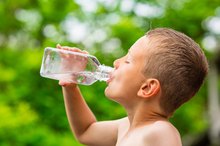What does fact checked mean?
At Healthfully, we strive to deliver objective content that is accurate and up-to-date. Our team periodically reviews articles in order to ensure content quality. The sources cited below consist of evidence from peer-reviewed journals, prominent medical organizations, academic associations, and government data.
The information contained on this site is for informational purposes only, and should not be used as a substitute for the advice of a professional health care provider. Please check with the appropriate physician regarding health questions and concerns. Although we strive to deliver accurate and up-to-date information, no guarantee to that effect is made.
How Many Liters of Water Should You Drink?
Humans and every other living being need water for survival. While you may be able to get by without food for a few weeks, you would live only a matter of days without water. How many liters of water you should drink each day depends on your size, amount of physical activity and the weather, explains MedlinePlus, a website published by the National Institutes of Health 2.
Water's Vital Roles
About 60 to 65 percent of your body weight comes from water, according to Iowa State University 4. Water creates the environment that enables metabolic processes. All of the cells in your body exist in a watery environment, with fluids inside and outside each cell that carry nutrients and wash away waste products. Water regulates your body temperature and forms a lubricant that protects structures such as your eyes and spinal cord from shock. Working together with the electrolytes sodium and potassium, water controls the volume of your blood, which determines blood pressure.
- About 60 to 65 percent of your body weight comes from water, according to Iowa State University 4.
- All of the cells in your body exist in a watery environment, with fluids inside and outside each cell that carry nutrients and wash away waste products.
Daily Recommendation
Why Is Water Important in a Balanced Diet?
Learn More
The most important thing to remember about water is that the amount you consume must balance the amount lost. This means your minimal daily requirement may differ from the recommended intake because your diet, environment, activity level and overall health may increase your water needs. The recommended daily intake for water, which includes drinking water and beverages, is 9 cups for women and 13 cups for men. The Institute of Medicine actually recommends a total water intake of 11 cups daily for women and 16 cups daily for men, but about 20 percent of your total water comes from foods.
- The most important thing to remember about water is that the amount you consume must balance the amount lost.
- The Institute of Medicine actually recommends a total water intake of 11 cups daily for women and 16 cups daily for men, but about 20 percent of your total water comes from foods.
Evaluate the Variables
If you have a fever or you're sick with vomiting or diarrhea, you will need more water to replace the extra fluids lost. Excessive sweating from any cause, whether you're outside on a hot day or due to intense exercise, means you'll have to drink more fluids. Getting enough water is especially important for athletes because losing water has a significant impact on athletic performance. You can estimate your water loss from sweating by weighing yourself before and after exercise. For every pound of weight lost, you'll need 2 cups of water to replace the sweat loss, according to Iowa State University 4.
- If you have a fever or you're sick with vomiting or diarrhea, you will need more water to replace the extra fluids lost.
Dehydration and Overhydration
How Much Water Should Adolescents Consume?
Learn More
Feeling thirsty is an early sign of dehydration, so drink fluids as soon as thirst develops. Other early signs of dehydration include dry mouth and skin and producing less sweat and urine than normal. Your brain is very susceptible to lack of water, so confusion or feeling faint are signs that dehydration is severe. If it isn't treated, dehydration becomes a medical emergency that can cause shock, kidney and liver damage and coma. Overhydration is usually caused by kidney disease rather than drinking too much water. Too much water in your body leads to low sodium, which can cause sluggishness, muscle twitches and seizures. Endurance athletes who overhydrate are also susceptible to these symptoms.
- Feeling thirsty is an early sign of dehydration, so drink fluids as soon as thirst develops.
- Your brain is very susceptible to lack of water, so confusion or feeling faint are signs that dehydration is severe.
Related Articles
References
- Merck Manual Home Health Handbook: About Body Water
- MedlinePlus: Water in Diet
- Merck Manual Home Health Handbook: Dehydration
- Iowa State University: Fluids
- Merck Manuel Home Health Handbook: Overhydration
- National Academies of Sciences, Engineering and Medicine, Health and Medicine Division. "Dietary Reference Intakes Tables and Application."
Writer Bio
Karen Hellesvig-Gaskell is a broadcast journalist who began writing professionally in 1980. Her writing focuses on parenting and health, and has appeared in “Spirituality & Health Magazine" and “Essential Wellness.” Hellesvig-Gaskell has worked with autistic children at the Fraser School in Minneapolis and as a child care assistant for toddlers and preschoolers at the International School of Minnesota, Eden Prairie.









